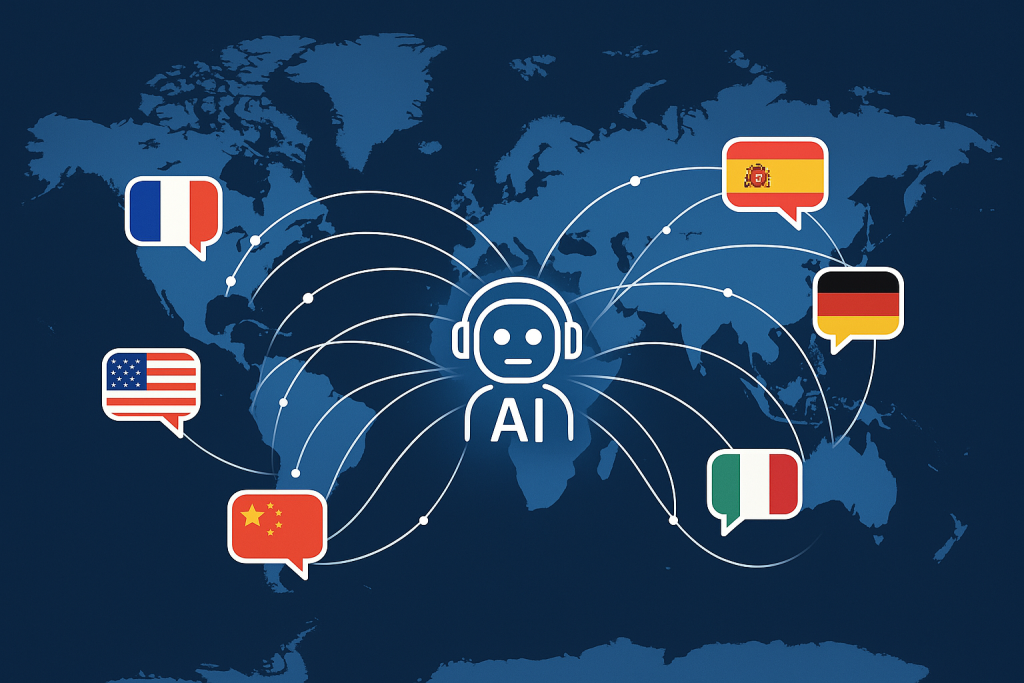How Artificial Intelligence Is Revolutionizing Multilingual Support in Businesses

Artificial Intelligence (AI) is no longer a futuristic promise—it has become an essential tool in the daily operations of businesses. In 2025, the democratization of knowledge through AI is not only changing the way people access information but also how companies communicate with their customers. One of the areas undergoing the most significant transformation is multilingual support, where AI enables high-quality, instant assistance in multiple languages—without the need to multiply human resources.
In this article, we’ll explore how AI is breaking language barriers, facilitating business internationalization, and enhancing customer experience. We’ll also look at how platforms like REPLAI allow companies to integrate this technology simply and effectively.
Democratizing Knowledge and Language
Artificial Intelligence is enabling millions of people to access knowledge without relying on intermediaries, translating complex content into understandable, personalized language. This same principle applies to the business world: knowledge and customer service are no longer limited by language.
Thanks to large language models developed by companies like OpenAI, Google, or Meta, it’s now possible to generate coherent and culturally adapted responses in dozens of languages. According to a study by McKinsey & Company, using generative AI in customer support can increase efficiency by up to 45% and reduce response times by more than 30%.
This is a true revolution for companies operating in multiple countries or serving international clients from a single operations center.
Why Is Multilingual Support Essential?
Multilingualism is no longer optional—it’s a competitive necessity. In Spain, a country with a highly internationalized economy and booming tourism, multilingual support is key in sectors such as e-commerce, tourism, education, and software.
A report by CSA Research revealed that 76% of consumers prefer to buy products with information in their native language, and 40% won’t purchase from websites that aren’t translated. Add to that the need for personalized post-sale support: users don’t just want to understand—they want to feel understood.
AI as a Linguistic Bridge
Advancements in natural language processing (NLP) have enabled chatbots and virtual assistants to hold fluid, contextual conversations in multiple languages. And it’s not just about translation—AI can understand local expressions, slang, emotional tone, and adapt its responses to offer a truly human experience.
Technologies such as neural translation and machine learning allow these solutions to improve with every interaction. For example, REPLAI lets companies deploy a chatbot that not only responds in several languages but also adapts its tone and communication style according to the user’s culture. A customer speaking Latin American Spanish? Another using technical French? The AI detects it and adjusts its communication automatically.
Use Case: 24/7 Multilingual Customer Support
Imagine a Spanish company exporting to France, Germany, and Portugal. In the past, they would’ve had to hire native agents or translators—entailing high costs, operational challenges, and delays. With solutions like REPLAI, they can now offer immediate support in all those languages, 24 hours a day, 7 days a week.
It’s also possible to integrate knowledge bases, FAQs, or technical documentation in any language, maintaining consistency across all channels. The result: a smoother, more professional, and more cost-effective customer experience.
Benefits of AI-Powered Multilingual Support
- Cost savings: no need for language-specific teams.
- Wider availability: 24/7 support regardless of time zones.
- Scalability: add new languages in minutes.
- Improved user experience: customers feel more comfortable and valued.
- True internationalization: entry into new markets without large initial investments.
What About Cultural Nuance?
One of the major limitations of traditional automatic translation was the inability to grasp context and nuance. But that has changed. Today’s AI, trained on diverse cultural contexts, can generate responses that are not only “well-translated” but culturally appropriate.
This is especially valuable in sensitive sectors like tourism, healthcare, or education, where poor interpretation can have serious consequences. With REPLAI, every conversation is adapted to the user’s cultural context, ensuring a warm and accurate experience.
Conclusion
Artificial Intelligence has unlocked a new paradigm in business communication—one where language is no longer a barrier. In an increasingly globalized world, offering multilingual support is not just a competitive edge—it’s a necessity. Businesses that embrace it are ahead of the curve, not only in customer service but also in efficiency, profitability, and brand reputation.
Thanks to solutions like REPLAI, it’s now possible to integrate multilingual AI chatbots capable of delivering personalized, real-time support in the language your customer needs. And the best part: no technical headaches or major investments.
Ready to take your business to the next level with intelligent, multilingual support? Discover everything we can do for you at 👉 www.replai.net

